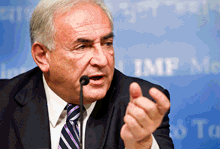
Typical street scene in Santa Ana, El Salvador. (Photo: iStock)
IMF Survey: Quick, Forceful, Cooperative Action Needed on Crisis—IMF
October 9, 2008
- Crisis marked by regulatory, supervisory failures in advanced economies
- National plans should include recapitalization of financial institutions
- Cooperation across countries key to effective resolution of crisis
Problems in the financial markets and in the global economy can be solved "if we act quickly, forcefully, and cooperatively,"IMF Managing Director Dominique Strauss-Kahn said.

Global financial crisis marked by failures in risk management, market discipline mechanisms, says IMF's Strauss-Kahn (photo: Newscom)
INTERNATIONAL FINANCIAL ARCHITECTURE
He told a press briefing ahead of the IMF-World Bank Annual Meetings that the international financial architecture had failed to adapt to globalized financial markets. World economic and financial authorities are gathering in Washington for the October 13 Annual Meetings after weeks of turmoil in global equity and financial markets. They will discuss possible further steps to solve the crisis.
Strauss-Kahn said the global financial crisis had been marked by important regulatory and supervisory failures in advanced economies, in the risk management frameworks of major private financial institutions, and in market discipline mechanisms. The world is on "the cusp of a global recession," but if countries act together, the world economy would recover, he stated.
On October 8 the IMF unveiled a gloomy forecast for world growth, saying that the world economy is entering a major downturn in the face of the most dangerous financial shock in mature financial markets since the 1930s.

Strauss-Kahn at news conference ahead of IMF-World Bank Annual Meetings: "There is no domestic solution to a crisis like this one" (IMF photo)
Strauss-Kahn noted that emerging market economies had been affected by the crisis as trade was hit by slowing growth in advanced economies and as credit lines were cut. The IMF had activated emergency procedures to respond quickly to requests for support with high-access financing, based on streamlined conditionality that focused on crisis response priorities.
Coordinated action
Four principles drawn from the IMF's experience in handling past crises had been discussed by the IMF Executive Board, Strauss-Kahn said.
• State action needs to have a clear objective so that effective oversight of how public money is used is possible.
• National plans need to be comprehensive: they should provide liquidity from central banks, contain guarantees to depositors and assurances to creditors and, most important, include recapitalization of financial institutions.
• Action should be coordinated, at the global level and at regional level, as with the recent coordinated central bank action on interest rates.
• Taxpayers should be able to share upside risks once the crisis passes.
The need for recapitalization was well understood on both sides of the Atlantic, Strauss-Kahn said, but he added that cooperation was less evident. He urged European countries to work together: "There is no domestic solution to a crisis like this one."
Seven IMF messages
Strauss-Kahn said the IMF had seven messages to convey on action to counter the global financial crisis:
• All kinds of policy cooperation are to be commended. Unilateral actions should be avoided.
• The crisis is serious and protracted, but a slow recovery should begin in the second half of 2009.
• Following the activation of its emergency lending procedures, the IMF is ready to answer any request for support from countries facing problems.
• While the IMF welcomed fiscal and monetary action to calm the turmoil, macroeconomic policies had to be combined with action on the financial front.
• Policymakers should not forget "the other crisis"—the effects of the surge in food and fuel prices. Advanced countries should not respond to the financial crisis by cutting aid to the poorest and most vulnerable countries.
• Authorities need to draw lessons from the crisis for financial regulation and supervision, including issues such as fair value accounting, changing rating agency behavior, closing loopholes in regulations, and filling gaps in information. "We need to come up with practical advice on how governments and central banks can use macroeconomic policies to puncture asset bubbles in good times."
• The global financial architecture needs to be revamped to meet the need of 21st century globalized markets.
Failure to adapt
Strauss-Kahn said policymakers should not wait until the end of the current crisis before acting. The global financial architecture had clearly failed to adapt to globalized financial markets. The architecture's legitimacy and effectiveness had been called into question.
"Legitimacy means that all countries have to be involved in the solution, because they are all involved in the problems. Effectiveness means we have to use the experience that has been accumulated in the international financial institutions, and that they follow up," Strauss-Kahn said.
Strauss-Kahn illustrated his key messages with a slideshow. Click on the slides below to see the show or download (pdf) the presentation now.
Comments on this article should be sent to imfsurvey@imf.org


